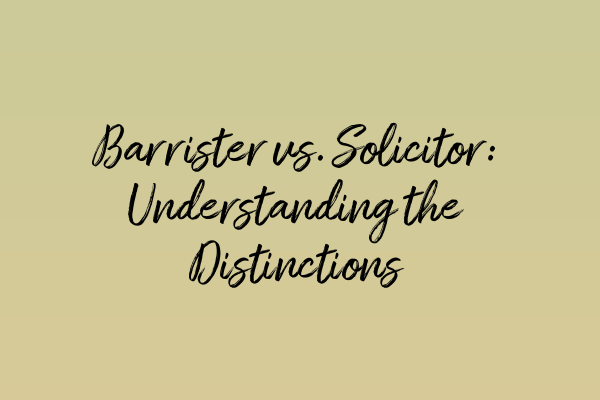If you’re considering a career in the legal profession, you’ve likely come across the terms “barrister” and “solicitor.” While these two roles are both vital to the legal system, they differ significantly in their duties, training, and scope of practice. Understanding the distinctions between barristers and solicitors is crucial in deciding which path to pursue.
In this article, we’ll delve into the differences between barristers and solicitors to help you gain a comprehensive understanding of these legal professions.
What is a Barrister?
A barrister is a specialist advocate who represents clients in court and provides legal advice on complex matters. They are typically involved in higher court proceedings, such as trials and appeals, and are often consulted by solicitors for their expertise in specific areas of law.
To become a barrister, individuals must complete a law degree followed by vocational training at one of the Inns of Court. This training includes the Bar Professional Training Course (BPTC) and a period of pupillage, during which aspiring barristers shadow experienced barristers to gain practical experience.
Once called to the Bar, barristers can either practice as self-employed individuals or join a barristers’ chambers. They often specialize in a particular area of law, such as criminal law, family law, or commercial law.
Unlike solicitors, barristers generally do not have direct contact with clients and primarily interact with them through solicitors. They’re responsible for representing clients in court, preparing legal arguments, cross-examining witnesses, and advising on legal matters.
Related article: Mock Tests for SQE Criminal Practice: Test Your Knowledge and Skills
What is a Solicitor?
A solicitor is a legal professional who provides legal advice and assistance to clients. They are the first point of contact for individuals seeking legal help and can represent clients in lower court proceedings. Solicitors generally have direct client interaction and handle a wide range of legal matters, including drafting contracts, negotiating settlements, and preparing legal documents.
To qualify as a solicitor in England and Wales, individuals are required to complete a law degree, the Legal Practice Course (LPC), and a two-year training contract with a law firm. During the training contract, aspiring solicitors gain practical experience in different areas of law and work under the supervision of qualified solicitors.
Once qualified, solicitors can work in private practice, government, in-house legal departments, or non-profit organizations. They may choose to specialize in a particular area of law or provide general legal services.
While solicitors can represent clients in court, their advocacy work is typically limited to lower court proceedings, such as the Magistrates’ Court or County Court. If a case requires representation in higher courts, solicitors may instruct a barrister to handle the court advocacy.
Related article: SQE Prep Made Easy: Strategies and Resources
Key Distinctions Between Barristers and Solicitors
Here are some key distinctions between barristers and solicitors:
- Training: Barristers undergo vocational training at the Inns of Court, while solicitors complete the Legal Practice Course (LPC) and a two-year training contract with a law firm.
- Court Representation: Barristers have the right to represent clients in all courts, including higher courts. Solicitors can represent clients in lower court proceedings and may instruct a barrister for higher court advocacy.
- Client Interaction: Solicitors have direct contact with clients, providing legal advice, negotiating settlements, and handling legal transactions. Barristers primarily interact with clients through solicitors and focus on court representation and legal arguments.
- Specialization: Barristers often specialize in a specific area of law, such as criminal law or family law. Solicitors may also specialize but frequently provide a broader range of legal services.
Both barristers and solicitors play essential roles in the legal profession, complementing each other’s expertise to provide comprehensive legal services to clients.
Related article: SQE Prep: Tips and Tricks to Excel in Criminal Law
Conclusion
While barristers and solicitors are both legal professionals, they have distinct roles and responsibilities within the legal system. Barristers specialize in court advocacy and provide expert legal advice, primarily assisting solicitors in higher court proceedings. Solicitors, on the other hand, engage directly with clients, offering legal advice and handling a broad range of legal matters.
Ultimately, choosing between a career as a barrister or solicitor depends on your interests, strengths, and career goals. Consider your aptitude for court advocacy, client interaction, and the specific areas of law that interest you to make an informed decision.
Related article: Terrorism and Criminal Law: Balancing National Security with Justice
Related article: Summary vs. Indictable Offences: Understanding the Differences


Leave a Reply